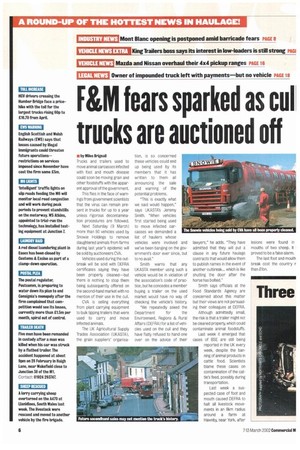F8611 fears sparked as cul trucks are auctioned off
Page 6

If you've noticed an error in this article please click here to report it so we can fix it.
• by Miles Brignall Trucks and trailers used to move animal carcasses infected with foot and mouth disease could soon be moving grain and other foodstuffs with the apparent approval of the government.
This flies in the face of warnings from government scientists that the virus can remain present in trucks for up to a year unless rigorous decontamination procedures are followed.
Next Saturday (9 March) more than 50 vehicles used by Snowie Holdings to remove slaughtered animals from farms during last year's epidemic will be sold by auctioneers CVA.
Vehicles used during the outbreak will be sold with DEFRA certificates saying they have been properly cleaned—but there is nothing to stop them being subsequently offered on the second-hand market with no mention of their use in the cull.
OVA is selling everything from plant carrying equipment to bulk tipping trailers that were used to carry and move infected animals.
The UK Agricultural Supply Trades Association (UKASTA). the grain suppliers organisa Lon, is so concerned these vehicles could end up being used by its members that it has written to them all announcing the sale and warning of the potential problems, "This is exactly what we said would happen," says UKASTA's Jeremy Smith. "When vehicles first started being used to move infected carcasses we demanded a list of hauliers whose vehicles were involved and we've been banging on the government's door ever since, but to no avail."
Smith warns that any UKASTA member using such a vehicle would be in violation of the association's code of practice, but he concedes a member buying a trailer on the used market would have no way of checking the vehicle's history.
"We repeatedly asked the Department for the Environment, Regions & Rural Affairs (DEFRA) fora list of vehicles used on the cull and they have flatly refused to hand one over on the advice of their lawyers," he adds. "They have admitted that they will put a clause in any future haulage contracts that would allow them to publish names in the event of another outbreak... which is like shutting the door after the horse has bolted."
Smith says officials at the Food Standards Agency are concerned about this matter but their views are not persuading their colleagues at DEFRA.
Although admittedly small, the risk is that a trailer might not be cleaned properly, which could contaminate animal foodstuffs.
Last week it emerged that cases of BSE are still being reported in the UK every week, despite the banning of animal products in cattle food. Scientists blame these cases on contamination of the cattle's feed, possibly during transportation.
Last week a suspected case of foot and mouth caused DEFRA to halt all livestock movements in an Bkm radius around a farm at Hawnby, near York, after
lesions were found in mouths of two sheep. It I proved to be a false alarm.
The last foot and mouth break cost the country r than Elbn.
























































































































































